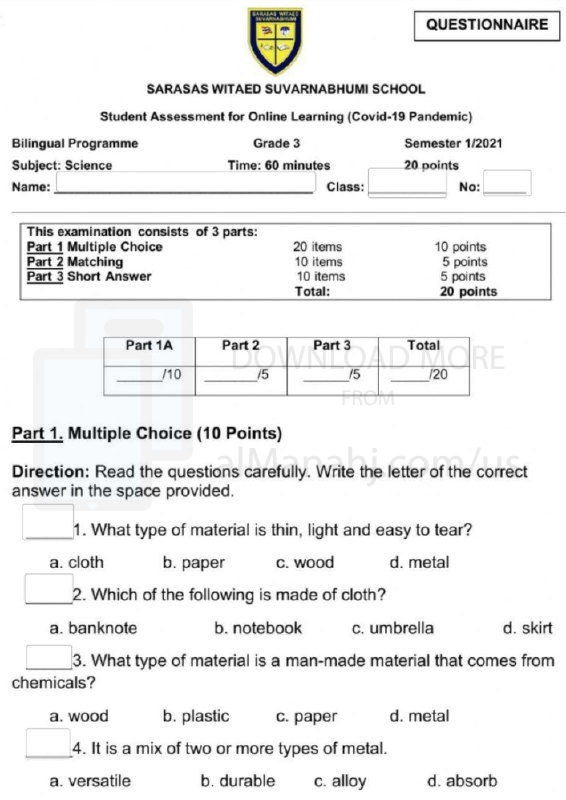File info: A Final Science Review for Grade 3 is an assessment tool designed to evaluate students' understanding of key science concepts and topics covered throughout the school year. It serves as a comprehensive review of the science curriculum, allowing students to demonstrate their knowledge and skills in various areas of science. Here's a description of what a Final Science Review for Grade 3 might include:
1. Review Format: The description of the science review provides an overview of its format. It may indicate whether the review is divided into sections or units, the number of questions, and the total duration of the review.
2. Topics Covered: The review covers a range of science topics that have been taught during the grade 3 curriculum. This can include areas such as life science, physical science, earth science, and scientific inquiry. The specific topics covered may vary depending on the school or district curriculum.
3. Multiple-Choice Questions: The review may include multiple-choice questions that assess students' knowledge and understanding of scientific concepts. These questions are designed to test comprehension, recall, and application of scientific information.
4. Vocabulary and Terminology: The review may include questions that assess students' understanding of scientific vocabulary and terminology. This can include matching definitions to terms, completing sentences with the appropriate scientific words, or identifying the correct scientific term for a given concept.
5. Diagrams and Visuals: The review may include questions that require students to interpret and analyze diagrams, charts, or images related to scientific concepts. Students may be asked to label parts of a diagram, identify objects or processes shown in visuals, or explain the information conveyed by a graph or chart.
6. Scientific Inquiry Skills: The review may assess students' understanding of scientific inquiry skills, such as observation, prediction, data collection, and drawing conclusions. Students may be presented with scenarios and asked to identify the appropriate scientific method or process to solve a problem or answer a question.
7. Application of Knowledge: The review may include questions that require students to apply their scientific knowledge to real-life situations. These questions can assess students' ability to make connections between scientific concepts and their practical applications.
8. Critical Thinking: The review may include higher-order thinking questions that require students to analyze, evaluate, and explain scientific phenomena. These questions may involve problem-solving, making predictions, or providing explanations for observed phenomena.
9. Grading and Evaluation: The description may provide information on how the review will be graded and evaluated. It may include details about the scoring criteria, such as allocating points to each section or question type. The review results are typically used to assess students' overall understanding of science concepts and their ability to apply scientific thinking and reasoning skills.
The purpose of a Final Science Review for Grade 3 is to assess students' knowledge, understanding, and application of science concepts covered throughout the school year. The review helps identify areas of strength and areas that may require further reinforcement. It provides students with an opportunity to review and consolidate their learning, as well as to demonstrate their scientific knowledge and skills. Additionally, the review serves as a valuable tool for teachers to evaluate the effectiveness of their instruction and to inform future lesson planning and curriculum development. |
